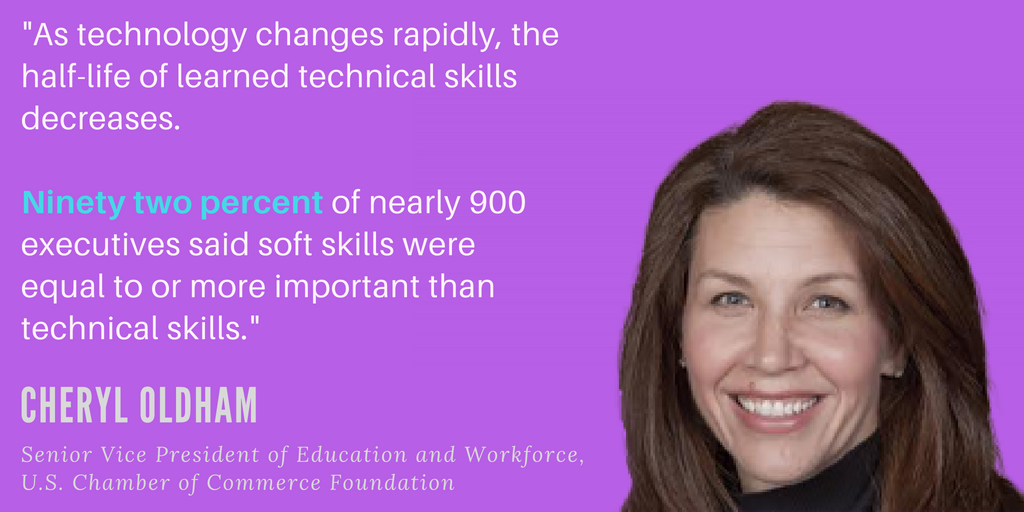Topics
May 30, 2018
Why Soft Skills are the Number One Priority for Learning and Development

“Alexa, increase the time management skills of the Finance department and improve communication across Human Resources.”
The machines are not quite ready to take over the organization…yet. With the rise of intelligent machines and AI poised to change the labor market, employee tasks are shifting from repetitive to autonomous or team-based tasks. We humans and our ability to interact effectively are still relevant. It is these “soft” skills – important job-related skills involving little to no interaction with machines – that make teams productive. Organizations are also shifting from command-centric hierarchies to a flatter structural model, which requires employees at all levels to be more proficient in soft skills. Unlike technical or hard skills, soft skills are required in almost every job function and can positively affect organizational performance.
Soft skills are critical in today’s labor market
In a recent LinkedIn study, 58% of hiring managers indicated that a lack of candidate’s soft skills is “limiting their company’s productivity.” As the nature of work changes to a knowledge-based global economy, employers are looking for soft skills to stay competitive.

As technology changes rapidly, the half-life of learned technical skills decreases. Ninety-two percent of nearly 900 executives said soft skills were equal to or more important than technical skills. Cheryl Oldham, Senior Vice President, U.S. Chamber of Commerce Foundation, Center for Education and Workforce reports that businesses need workers not only with qualifications, but also who can “show up to work on time, dress appropriately, and work well with a team.” Technical skills are important, but the personal capabilities and social skills required to work productively with others are becoming even more critical. Millennials are frequently much more adept in technical skills but may be lacking in soft skills, like communication and problem-solving. As millennials begin to grow as leaders, they are presented with “complex leadership roles on multigenerational teams” that require higher-level soft skills.
Which soft skills are in demand?
The term “soft skills” casts a wide net including social and interpersonal skills such as communication, emotional skills like empathy, and behavioral attributes as in initiative. Based on research at LinkedIn, the National Education Association, Training Magazine, Inc. Magazine and Wonderlic there are an overlapping set of skills in high demand for the 21st Century.
- Communication
- Collaboration
- Critical Thinking
- Time Management
- Emotional Intelligence (Self-management and Empathy)
- Leadership
The full list of soft skills needed in today’s workforce is much longer, but these skills were at the top. Most of these skills are required in a team-based environment and many of them have become more complex due to the increase in technology. Written communication can be in email form as well as in Instant Message or internal social media. Oral communication is no longer simply face-to-face, it could also range from phone interactions, webcam-enabled discussions all the way up to fully immersive telepresence. Each of the soft skills grows increasingly complex when time zones and multiple cultures are added due to globalization.
Is there an ROI there?
There is no shortage of general soft skills training on the market. Countless libraries of paid and freemium content exist in the internet ether, but does growing soft skills actually measurably improve the business? Recently professors from MIT Sloan, the University of Michigan and Boston College put together a 12-month soft skills training program that yielded approximately a 250% return. What was even more striking was that the control employees who worked alongside the newly trained team members received roughly 70% in “spillover” benefits from the initial training. If measured properly, soft skills can deliver hard results. Professor James Heckman, Nobel Prize-winning economist, references a growing body of hard evidence that soft skills are critical for success.

How can organizations build (and maintain) strong soft skills?
Building soft skills takes more than a series of lectures or a set of online modules. Organizations need to think creatively when developing employee soft skills.
- Build soft skills into problem-solving – MIT utilizes action learning labs to weave soft skills training into projects designed to address organizational challenges. Students work in diverse teams practicing collaboration as a part of the lab.
- Provide coaching and feedback – many business schools are building feedback loops after training where students can discover what their peers feel about their soft skills and coaches can partner to reinforce new behaviors.
- Leaders teaching leaders – involving the management team is a great way to build in soft skills as a core expectation. When leader teach, they have the ability to offer personal tips and unforgettable life lessons that can resonate with junior leaders.
- Balance results and behaviors – think carefully about the manager who achieves results, but has such low soft skills that they leave a train of bruises. Part of every job description needs to include playing well with others and organizations need to evaluate soft skills during performance management cycles.
- Reinforcement is key – once the organization is clear about the expectations for soft skills, it pays to hire, fire, and reward based on adherence to the behavioral standards. When employees see key decisions made based on target behaviors, it will be easier to sustain training gains.
The demand for “soft skills” is high, but a stigma around the phrase remains. As our businesses and job becomes more complex, it may be time to follow Seth Godin’s lead and start calling these “real skills”. Real skills for the real work of the 21st Century.

